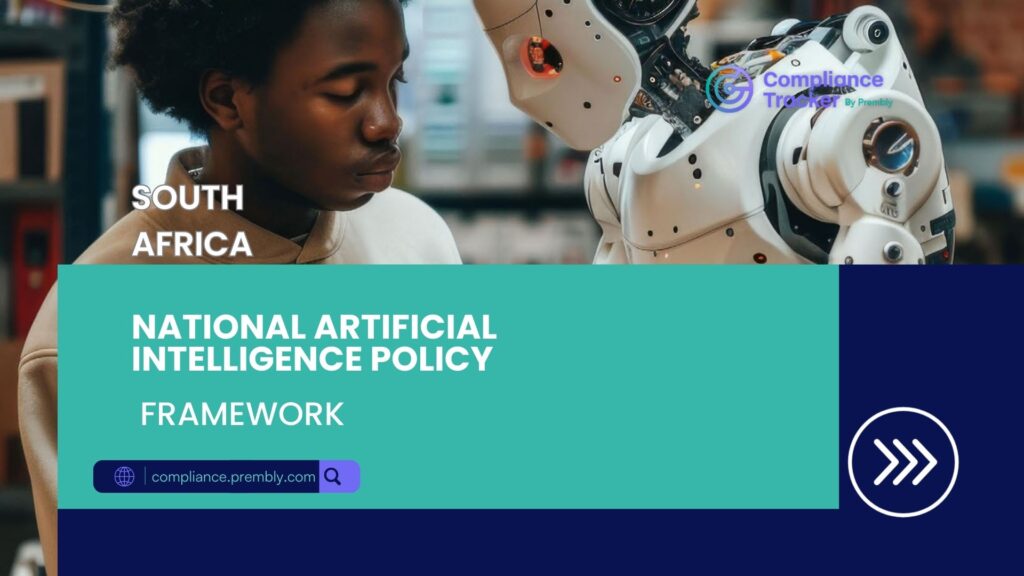
Introduction
The regulatory landscape in South Africa’s artificial intelligence (AI) sector is rapidly evolving, driven by the National AI Policy Framework. This policy outlines key strategies for AI deployment, focusing on balancing technological innovation with ethical governance. As AI becomes embedded across various industries, companies need to align their operations with the new frameworks that emphasize data governance, transparency, and fairness. This report analyzes the latest regulatory updates and offers practical action points to ensure compliance.
Regulatory Changes in South Africa’s artificial intelligence
1. AI Ethics and Transparency
The framework introduces ethical AI guidelines to build public trust and ensure responsible AI use. It mandates organizations to prioritize transparency, mitigate bias, and adopt explainable AI models. The policy requires the involvement of human oversight in decision-making processes, especially in critical applications like healthcare and finance.
Action Points:
- Conduct regular algorithm audits to ensure systems are free from biases.
- Implement explainable AI to make decision-making processes transparent.
- Develop human-in-the-loop systems to integrate human judgment into AI outputs.
2. Data Protection and Privacy Compliance
Data privacy remains a cornerstone of the AI framework. Businesses must align with POPIA (Protection of Personal Information Act) while implementing AI models, ensuring that data handling processes are secure and transparent. As AI systems rely heavily on data, organizations are required to protect personal information and disclose data usage practices.
Action Points:
- Strengthen data governance frameworks to regulate data collection and storage.
- Ensure compliance with POPIA through data protection officers and internal audits.
- Provide customers with easy access to their data and facilitate correction or deletion requests.
3. Mitigating Bias and Ensuring Fairness
The framework emphasizes the importance of fair AI systems by addressing biases within datasets. Ensuring diverse and inclusive datasets is critical to prevent algorithmic discrimination. AI technologies must promote social equity by improving access to public services and reducing economic inequalities.
Action Points:
- Train AI models on diverse datasets to reflect all population groups.
- Create bias detection tools and review decision-making processes for fairness.
- Develop policies for equitable AI deployment, especially in sectors like healthcare and finance.
4. Cybersecurity and Risk Management
As AI systems become central to public and private operations, the policy calls for cybersecurity protocols to safeguard data and infrastructure from malicious threats. Risk management frameworks must address the vulnerabilities AI systems may introduce, particularly in financial sectors.
Action Points:
- Implement cybersecurity best practices and monitor systems for vulnerabilities.
- Develop incident response plans to manage data breaches effectively.
- Use real-time monitoring tools to detect suspicious activities in financial transactions.
5. Public and Private Sector Collaboration
The framework encourages public-private partnerships to foster innovation while ensuring that AI deployment aligns with regulatory standards. Collaborative efforts can drive research and development, promote startups, and enable shared infrastructure use.
Action Points:
- Partner with academic institutions to support AI research.
- Develop public awareness campaigns to build trust in AI technologies.
- Align internal compliance policies with government frameworks to ensure seamless collaboration.
Strategic Framework Pillars for Compliance
Talent and Capacity Development
The framework aims to bridge the skills gap by promoting AI education across educational levels and industries. Organizations need to invest in training programs to develop AI literacy and professional ethics.
Action Points:
- Integrate AI courses into employee development programs.
- Collaborate with academic institutions to foster real-world training initiatives.
- Promote continuous learning by offering workshops and certifications.
Digital Infrastructure Development
The policy framework supports expanding digital infrastructure to facilitate AI adoption. This includes investments in supercomputing resources and high-speed connectivity across industries and public services.
Action Points:
- Evaluate the need for cloud computing services and AI infrastructure upgrades.
- Engage in government initiatives promoting 5G and broadband expansion.
- Ensure that systems are scalable to accommodate future AI developments.
Emerging Trends
- AI and ESG Compliance Integration
AI governance frameworks are increasingly aligned with Environmental, Social, and Governance (ESG) principles, reflecting a broader shift towards sustainable development goals. Businesses will need to integrate AI policies into their ESG strategies to remain compliant. - Global Regulatory Alignment
South Africa is aligning its AI regulations with international frameworks such as those of the OECD and FATF. This alignment ensures consistency in areas like AML (Anti-Money Laundering) and KYC (Know Your Customer) compliance. - AI in Public Services
The public sector will increasingly use AI to optimize government functions, improve service delivery, and enable data-driven policies. Businesses must align their practices with government standards to participate in such programs.
Conclusion; South Africa’s artificial intelligence
The National AI Policy Framework offers a comprehensive roadmap for responsible AI adoption in South Africa. To comply with emerging regulations, businesses must focus on transparency, data governance, cybersecurity, and bias mitigation. Collaboration between the public and private sectors will be essential to build a robust AI ecosystem and drive innovation. Proactively aligning with these frameworks will not only ensure legal compliance but also position businesses as leaders in the digital economy.
By adopting the principles outlined in the policy, organizations can navigate the regulatory landscape effectively, ensuring both compliance and sustainable growth.
Read National AI Policy Framework Here.
Sign up for Prembly Compliance Tracker for all your Compliance Updates.
Last modified: October 19, 2024

